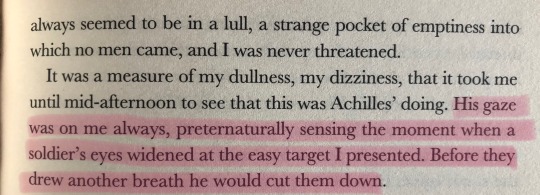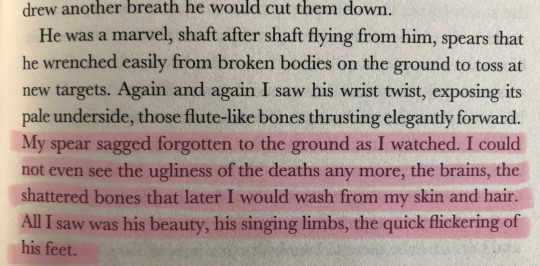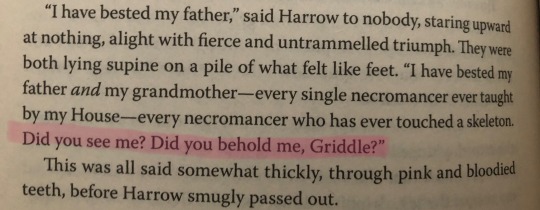#(her dads name being priamhark and all)
Explore tagged Tumblr posts
Text
Some exerpts from Gideon the Ninth and The Song of Achilles, respectively, for your consideration:










#harrow is paralleled with Achilles in a pretty obvious way#(her dads name being priamhark and all)#but today I was rereading the ending of gtn and noticed these parallels#and I just#ugh#not to mention the ending#the sacrafice of the beloved and the grief making unthinkable things possible#gay people crushing my heart over the span of more than twelve thousand years#tlt#gtn#tsoa#parallels
8 notes
·
View notes
Text
Gideon the Ninth, Bonus Content, Naming Systems
(Curious what I'm doing here? Read this post! For detail on The Locked Tomb coverage and the index, read this one! Like what you see? Send me a Ko-Fi.)
The final Gideon the Ninth paperback bonus content: "A Little Explanation of Naming Systems".
First, the official explanation that your last name in the Nine Houses is not a family name, it's an arithmonym.(1) The first name is sometimes used to indicate family connection: the "hark" in "Harrowhark" is intentionally shared with her father, "Priamhark", and is a tribute to an ancestor of the Tombkeeper line. Thus, names like "Jeannemary" and "Coronabeth" derive from "heirloom name particles." Different Houses assign names in different ways.
Many Houses are also fond of referential diminutives (Mortus to Ortus).
Siblings, even twins, do not generally share last names, though sometimes they share parts of them. The Tridentarii being an exception, their shared name may indicate something about their parents' hopes for their children.(2) There are exceptions, such as the three Asht brothers who were definitively not triplets.
Names do not change with marriage. Non-necromancers pick which of the couple's houses to settle and affiliate themselves and their future children with. Necromancers do not marry outside their Houses, so stay affiliated with their native one. There are some additional rules imposed by certain Houses, such as, if a child is born with a Sixth parent, that child is automatically and irrevocably of the Sixth,(3) "which can prove a legal nightmare".
Here we switch to a note that not all names are included in the pronunciation guide that follows, "due to their appearance in the Bible or elsewhere (the Second, the Fifth, Isaac, Silas)."(4) Also, Muir says she's included some meta-notes to explain some of the jokes and references in her names, but adds:
You don't have to read these. Put your thumb over them if you like.
Harrowhark Nonagesimus: Harrow to rhyme with arrow. Noh-nah-GUESS-i-mus, with the last i like "bitter", and mus just this side of "moose". Harrow is named explicitly for the harrowing of Hell, and hark is an ominous word "that always precedes an awful time, in the old sense of "awe.""
Gideon Nav: nav like navigator. There are many reasons behind Gideon's name. The prophet "who really messed up the Midianites" is one. "Gideon is a prophetic name: someone named their own demise in her."
Ortus Nigenad: "ORT-us. To rhyme with tortoise, unless you pronounce tortoise "tor toys," in which case it doesn't." NIGH-ga-nad, with the hard G. Ortus is in reference to his father Mortus, but "Ortus by itself is the Latin for "rising." Is this hilarious or sad?"
Pelleamena Novenarius: Pelly-AM-enna, not ah-MAY-nah. Noh-ven-ARE-ee-us, with the same "oose" sound as Harrow's. Named for Peleus, the father of Achilles.(5)
Priamhark Noniusvianus: PRY-am-hark, three distinct syllables, with the h audible. NOH-nee-us-vee-AHN-us. "You should have the trick of the "us" sound by now. If you don't, it's fine, nobody cares, it's a random name in a novel about bonermancy."(6) Priam is a character from the Iliad, "famously a dad in a city about to go splat."
Aiglamene: Eye-GLAM-en-ay. From the French "aigle", the eagle.
Crux: rhymes with "sucks", means "cross" which has several layers of humour attached.(7)
Aisamorta: EYE-sa-mor-tah. "Aisa" is a Greek word related to destiny.
Lachrimorta: LACK-ri-mor-tah. From Latin "lacrima" (tears, the kind that well and drop from the eyes).
Glaurica: GLAU-ri-kah. Ri from "ridicule", not "reed".
Judith Deuteros: DEW-ter-oss. The Biblical Judith beheaded the general Holofernes,(8) in the deuterocanonical(9) Book of Judith. Also, the "Book of Deuteronomy is a very didactic(10) text."
Marta Dyas: DIE-ass, and Muir apologizes for not having a better way to explain. Marta, like martial, of war. "The Second House names are serious business."
Ianthe Tridentarius: Ee-AHN-thay, Try-den-TAR-ee-us.
Coronabeth Tridentarius: Cor-OWN-a-beth. Corona like a halo.
The twins were originally to be named Cainabeth and Abella, which Muir says was so unsubtle she "might as well have just gone with "Goodtwin" and "Badtwin." And it's not even accurate! It should be Badtwin, and Lessbadtwin."
Naberius Tern: Na-BEER-ee-us, this time "us" as in "fuss". TURN, like wishing he would turn and walk out the door. "Naberius is one of the demon princes of Hell. Will this mean anything significant later on?? (No.)"
Jeannemary Chatur: JOHN-mair-ee, with a soft, French "j" but definitely Mary, not Marie. Cha-TOUR, not chatter, "though that'd be appropriate." Jeannemary is "a Biblical car crash"(11), but Jeanne is specifically a reference to Jeanne D'Arc.(12)
Isaac Tettares: Tett-AR-ez, not "tett-aries". Isaac foreshadows Jesus's death in the Bible, by bringing the wood for his own sacrifice up a mountain. Here, Isaac foreshadows Gideon's death, by doing the brave thing. "I might as well have called Jeannemary and Isaac "Don'tgetattached" and "Deadsoon.""
Palamedes Sextus: Pal-AM-a-dees, and Muir had a comparison but removed it.(13) SEX-tus with the "us" as in "bus". Was briefly named Diomedes, "Athena's favourite goodboy in the Iliad," but that would've taken away Gideon's "stupidest joke in the book."(14)
Camilla Hect: last name to rhyme with "wrecked". Camilla's name was chosen to complement Palamedes's, as the necromancer and cavalier pairs who love each other often share a syllable or sound. In their case, "am", and in the case of Abigail and Magnus, the "g".
Dulcinea Septimus: Dul-sin-AY-a, not dul-sinn-eya. SEPT-i-mus, Sept like September, and the moose returns.
Note: "Dulcinea" is the famously illusory persona assigned to the prostitute Aldonza in Don Quixote: a case of a woman you want to exist, but who really doesn't. In this essay I will"(15)
Protesilaus Ebdoma: Prot-eh-sil-OW-us, prot not prote. EBB-do-mah, ebb like the tide and doma like domain. Protesilaus was the first to die at Troy, and is the first to die because of the Lyctor trials. ""Johnny Quickdeath" would've also been a good pick."
Silas Octakiseron: Ock-ta-KISS-er-on, rather than keys-er-on.
Colum Asht: COL-um like "column", "asht" like "ash" with an extra sound on the end. Colum refers to Columba(16). The Asht brothers have the names of sacrificial animals: Colum ("dove" in Irish), Ram (like the sheep), and Capris (goat). Muir feels bad for meta-misusing the Asht bros so much that she couldn't even manage to make a reference to how "Capris" shares a name with a style of trouser.(17)
Incidental names and terms:
Matthias Nonius: Mah-TYE-us, with a hard T. NOH-knee-us. "As in, no knees for us." Absolutely a Redwall reference.
Cytherea: KITH-er-AY-a, a reference to Aphrodite.
Lyctor: LICK-tor. "In order to facilitate "Lyctor? I hardly touched her," stand up routines in the Nine Houses. Lyctor related to "lych" and to Lictor, Roman emperors' bodyguards.
Canaan House: KAY-nan.
Secundarius Bell: Se-cun-DAR-ee-us.
Drearburh: DREAR-burr. Drear like dreary, burh as a variant of burgh.(18)
=====
(1) From the Greek root "arithmos" (number) and "nym" (name). (2) My guess is, it was a way to force them to be perceived closer, to more effectively hide Corona's lack of aptitude for necromancy. (3) If they generally assign childbearing pairs in-house because of a shallow gene pool, it makes sense they'd formally instate such a rule to bring in as much depth as possible. (4) It would've been easy to say "names missing are probably pronounced the way you think they are" but I love "the Bible or elsewhere". (5) Any thoughts on what this means for Harrow's arc? (6) I think bonermancy is something quite different but I am deeply amused nevertheless. (7) In case anyone's curious, I count: --Cross as in angry, which Crux often is --Cross as in a dishonest contest or match, which is more what Harrow did than Crux, but I think bears mentioning --Cross as in to confront someone antagonistically, like he did to Gideon early on --Cross as in to betray, as in placing the bomb on the shuttle (8) This has been the subject of a great number of pieces of incredible art. Search "Judith and Holofernes" for more. I assume you don't need a gore warning if you've made it this far in the read. (9) Deuterocanonical - belonging to the second canon, or in plainer words, a group of Biblical books which some of the Christian denominations (mainly Catholic and Orthodox types) accept to be part of the Old Testament, but the Protestant denominations call apocrypha (to oversimplify: not real enough). (10) Didactic - intended to teach or educate, particularly with regard to morals. (11) You've got Jeanne as the feminine French form of "John", Mary is both the virgin mother and Mary Magdalene, one of Jesus's disciples and the first witness to his resurrection, occasionally said to have been Jesus's lover. Sometimes called a prostitute, but this seems to stem from a very odd interpretation by Pope Gregory I in 591 CE. (12) You might know her as Joan of Arc. (13) I still say "calamities" is pretty close, but a "deez nuts" joke wouldn't have gone astray here imo. (14) I think you mean BEST joke in the book, but that's opinion for you. (15) Yes it cuts off there, that's the joke. (16) An Irish missionary who spread Christianity in Scotland. (17) Pronounced very differently, but legit. (18) "burh" being much more likely to be pronounced corectly by Americans, is my guess, in addition to Muir enjoying using antiquated variants and synonyms.
13 notes
·
View notes